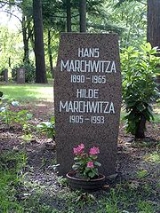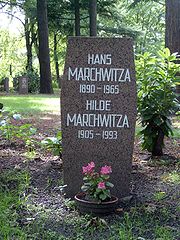
Hans Marchwitza
Encyclopedia

Germany
Germany , officially the Federal Republic of Germany , is a federal parliamentary republic in Europe. The country consists of 16 states while the capital and largest city is Berlin. Germany covers an area of 357,021 km2 and has a largely temperate seasonal climate...
writer, proletarian poet, and communist.
Life
Marchwitza was the son of minerMiner
A miner is a person whose work or business is to extract ore or minerals from the earth. Mining is one of the most dangerous trades in the world. In some countries miners lack social guarantees and in case of injury may be left to cope without assistance....
Thomas Marchwitza and his wife Thekla Maxisch, and was born in Scharley (Szarlej) (now a part of Piekary Śląskie
Piekary Slaskie
Piekary Śląskie is a city in Silesia in southern Poland, near Katowice. The north district of the Upper Silesian Metropolitan Union - metropolis with the population of 2 million...
) near Beuthen in Upper Silesia
Upper Silesia
Upper Silesia is the southeastern part of the historical and geographical region of Silesia. Since the 9th century, Upper Silesia has been part of Greater Moravia, the Duchy of Bohemia, the Piast Kingdom of Poland, again of the Lands of the Bohemian Crown and the Holy Roman Empire, as well as of...
. Already at fourteen years old (1904) Marchwitza was working underground in the mines. In 1910 in he was hired to work in the Ruhr area
Ruhr Area
The Ruhr, by German-speaking geographers and historians more accurately called Ruhr district or Ruhr region , is an urban area in North Rhine-Westphalia, Germany. With 4435 km² and a population of some 5.2 million , it is the largest urban agglomeration in Germany...
.
Two years later, however, he became unemployed because of his participation in a strike. Until he was drafted into the military in 1915, he worked as a laborer in odd jobs. He served on the Western Front
Western Front (World War I)
Following the outbreak of World War I in 1914, the German Army opened the Western Front by first invading Luxembourg and Belgium, then gaining military control of important industrial regions in France. The tide of the advance was dramatically turned with the Battle of the Marne...
until 1918.
In 1919 he joined the Independent Social Democratic Party of Germany
Independent Social Democratic Party of Germany
The Independent Social Democratic Party of Germany was a short-lived political party in Germany during the Second Reich and the Weimar Republic. The organization was established in 1917 as the result of a split of left wing members of the Social Democratic Party of Germany...
. In the following year, he fought as a commander for the Red Ruhr Army against the Kapp Putsch
Kapp Putsch
The Kapp Putsch — or more accurately the Kapp-Lüttwitz Putsch — was a 1920 coup attempt during the German Revolution of 1918–1919 aimed at overthrowing the Weimar Republic...
, Freikorps
Freikorps
Freikorps are German volunteer military or paramilitary units. The term was originally applied to voluntary armies formed in German lands from the middle of the 18th century onwards. Between World War I and World War II the term was also used for the paramilitary organizations that arose during...
groups, and the Reichswehr
Reichswehr
The Reichswehr formed the military organisation of Germany from 1919 until 1935, when it was renamed the Wehrmacht ....
during the Ruhr Uprising
Ruhr Uprising
The Ruhr uprising was a left-wing workers' revolt in the Ruhr in March 1920. The uprising took place initially on the occasion of the call for a general strike issued by the Social Democrat members of the German government in response to the Kapp Putsch of 13 March 1920:The first demonstrations...
. In 1920, he joined the Communist Party of Germany
Communist Party of Germany
The Communist Party of Germany was a major political party in Germany between 1918 and 1933, and a minor party in West Germany in the postwar period until it was banned in 1956...
. When France
France
The French Republic , The French Republic , The French Republic , (commonly known as France , is a unitary semi-presidential republic in Western Europe with several overseas territories and islands located on other continents and in the Indian, Pacific, and Atlantic oceans. Metropolitan France...
occupied the Ruhr area, he fought in resistance.
In the meantime, he again became unemployed because of his participation in a strike. In this period, he wrote his first literary pieces. Alexander Abusch
Alexander Abusch
Alexander Abusch was a German journalist, writer and politician. Abusch joined the Communist Party of Germany in 1918. He would serve as editor of some KPD publications. In 1937, he became part of the exiled KPD leadership in Paris, later in Toulouse. In 1941 he shifted to Mexico, were he became...
, an editor for the Ruhr-Echo supported him and published his initial piece. After 1924, he published in the Communist newspapers the Rote Fahne
Die Rote Fahne
The German newspaper Die Rote Fahne was created on 9 November 1918 by Karl Liebknecht and Rosa Luxemburg in Berlin, first as organ of the left wing revolutionary Spartakusbund. After the founding of the Communist Party of Germany on 1 January 1919 it became the central publication of the party,...
(Red Banner) and the Rote Front.
In 1929, he was invited along with a number of other journalists and writers to visit the Soviet Union
Soviet Union
The Soviet Union , officially the Union of Soviet Socialist Republics , was a constitutionally socialist state that existed in Eurasia between 1922 and 1991....
. In 1930, he published his first book Sturm auf Essen, reporting on the fighting in the Ruhr Area in 1920. After the seizure of power by the Nazis in 1933, he fled to Switzerland
Switzerland
Switzerland name of one of the Swiss cantons. ; ; ; or ), in its full name the Swiss Confederation , is a federal republic consisting of 26 cantons, with Bern as the seat of the federal authorities. The country is situated in Western Europe,Or Central Europe depending on the definition....
, but was expelled by 1934. Until 1935 he worked for the Communist Party in the French occupied Saarland
Saarland
Saarland is one of the sixteen states of Germany. The capital is Saarbrücken. It has an area of 2570 km² and 1,045,000 inhabitants. In both area and population, it is the smallest state in Germany other than the city-states...
and fought as an officer in the Spanish Civil War
Spanish Civil War
The Spanish Civil WarAlso known as The Crusade among Nationalists, the Fourth Carlist War among Carlists, and The Rebellion or Uprising among Republicans. was a major conflict fought in Spain from 17 July 1936 to 1 April 1939...
after 1936.
In 1938, he attempted to cross from Spain
Spain
Spain , officially the Kingdom of Spain languages]] under the European Charter for Regional or Minority Languages. In each of these, Spain's official name is as follows:;;;;;;), is a country and member state of the European Union located in southwestern Europe on the Iberian Peninsula...
to France
France
The French Republic , The French Republic , The French Republic , (commonly known as France , is a unitary semi-presidential republic in Western Europe with several overseas territories and islands located on other continents and in the Indian, Pacific, and Atlantic oceans. Metropolitan France...
but was arrested and detained by the French. In 1941, he succeeded in fleeing to the United States
United States
The United States of America is a federal constitutional republic comprising fifty states and a federal district...
. There he was detained but was later allowed to work in construction and other odd jobs. In 1946 he returned to Germany, first to Stuttgart
Stuttgart
Stuttgart is the capital of the state of Baden-Württemberg in southern Germany. The sixth-largest city in Germany, Stuttgart has a population of 600,038 while the metropolitan area has a population of 5.3 million ....
and then in 1947 to Babelsberg in the Soviet Occupation Zone. He became a founding member of the Academy of the Arts of East Germany. For this action, in 1950 he received the National Prize of East Germany
National Prize of East Germany
The National Prize of the German Democratic Republic was an award of the German Democratic Republic given out in three different classes for scientific, artistic, and other meritorious achievement...
, a prize he received again in 1955 and 1964. He also became a cultural attaché in Prague
Prague
Prague is the capital and largest city of the Czech Republic. Situated in the north-west of the country on the Vltava river, the city is home to about 1.3 million people, while its metropolitan area is estimated to have a population of over 2.3 million...
in 1950, an office he held until 1955. For his seventieth birthday he gained entrance into the Karl Marx Order and the honorary title of Dr. phil. h.c. from Humboldt University.
At age 75 on 17 January 1965 Marchwitza died in Potsdam
Potsdam
Potsdam is the capital city of the German federal state of Brandenburg and part of the Berlin/Brandenburg Metropolitan Region. It is situated on the River Havel, southwest of Berlin city centre....
.
Works
His autobiographical trilogy "Die Kumiaks" (1934, 1952, 1959) and autobiography "Meine Jugend" (1947) depict vivid scenes of the life of German working families in Silesia and the Ruhr Area.- Sturm auf Essen (Reportage, 1930)
- Walzwerk (Roman, 1932)
- Die Kumiaks (Roman, 1934)
- Meine Jugend (1947)
- In Frankreich (1949)
- Unter uns (Erzählungen, 1950)
- Die Heimkehr der Kumiaks (Roman, 1952)
- Die Kumiaks und ihre Kinder (Roman, 1959)
- In Amerika (Roman, 1961)
- Gedichte (1965)

